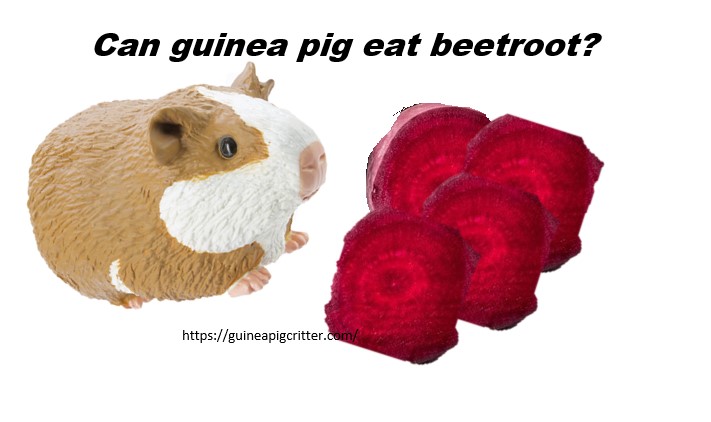Guinea pigs make friendly and active pets. We have the responsibility of ensuring that our pets are happy, healthy, and well-fed. That said, there may still be some confusion when it comes to diet.
Can guinea pigs safely consume beetroot? What amount of it is excessive for them? And these are some questions that are seemingly straightforward but you would be shocked to discover that many people have the same questions.
Check this post :-Can Guinea Pigs Eat Peas?
There are pet owners that wonder can guinea pigs eat beetroot.
Yes, guinea pigs can, but it should only serve as an occasional snack. It is crucial to remember that these sensitive animals have a dietary requirement that revolves around quality hay, leafy greens, and high-quality pellets. Although beetroot is indeed a healthy vegetable, being a fun snack is its only role in a guinea pig’s diet.
Yes, it’s accurate that beetroot has some health value, but when consumed in excess, it can severely endanger the health of your pet. Let’s focus on that.
At the end of the day, moderation is the golden rule when offering your guinea pig a beetroot and its true health benefits makes it a worthy dietary addition.
Vitamin c
Like humans, guinea pigs are unable to manufacture vitamin c by themselves. As a result, they need to be provided with vitamin c enriched food, failing which can lead to serious health concerns like scurvy. While beetroot is not the richest source, it does contain a considerable amount of vitamin c to help strengthen your guinea pig’s immune system and general health.
Fiber
Dietary fiber is very essential for the general wellbeing of a guinea pig’s digestive system. Like other vegetables, beetroot contains a fair amount of dietary fiber which helps improving digestion and maintaining a healthy gut, but remember hay is the most important source of fiber for guinea pigs.
Antioxidants
One of the reason why beetroot is very nutritious is that it is rich in many antioxidants that protect cells from damage caused by free radicals. These antioxidants can improve your guinea pig’s health and decrease the chances of them becoming ill due to complex diseases.
Other nutrients
Like many other vegetables, beta roots do contain some insignificant amount of the required elements such as potassium, magnesium and iron beneficial for guinea pigs.
Those were the advantages of beetroot, however consuming too much of beetroot can become detrimental. Health problems stemming from the overfeeding of beetroot will be analyzed next.
Dangers and disadvantages of giving beetroot to guinea pigs
Here are some potential downsides of giving beetroot to guinea pigs considering it as an option.
Health risks
Diabetes is just one of the problems associated with excess sugar intake. Your guinea pig not only will be on diabetic medication, but potentially also face an array of health issues. Their digestive systems are specifically delicate, meaning, feeding them high-sugar foods is detrimental to their health.
Bladder stone formation
Compounds of oxalates present in the beetroot can assist in potentially increasing the formation of bladder stones. Bladder stones are painful to experience and need urgent medical attention. Like diabetes, small amounts of oxalates, known to be safe, can lead to potential harm if beetroot is overfed.
Bloating
Overfeeding beetroot can lead to discomfort, diarrhea, and worst case worsening bloating, all of which are never pleasant to deal with. The digestive upset it can cause, is beyond, which is why moderation is key while introducing any new food.
Fur and bedding stains
The red color of beetroot might appeal to a lot, but it does come with cons such as destruction of bedding and fur. Along with that, their bedding would be nude of clean fur and colored pink instead, a change that makes one cringe.
How to feed beetroot to guinea pigs safely
Here’s how you should approach feeding guinea pigs beetroot. Follow this guideline to do it correctly;
Select fresh beetroot
When possible, always try to source fresh, organic beetroot. Avoid canned, pickled, or desiccated beetroot, as these may have harmful additives like sugar, salt, and preservatives that can be dangerous to guinea pigs.
Wash thoroughly
Utilize cold water to rinse off the beetroot in an attempt to get rid of any chemicals, dirt, or pesticides. If you’re using organic beetroot, it is still strongly suggested that you rinse it to eliminate chances of dirt contamination.
Remove skin
Peel the skin off. This will significantly reduce the chances of forming stones in the bladder. Skin contains higher volumes of oxalates.
Cut into small pieces
A single serving should be about a teaspoonful in size; this means you will need to slice the beetroot into small, bite-sized pieces so that they are easy to chew. Always remember to practice moderation!
Serve raw
Beetroot should, however, only be served raw to guinea pigs. Cooking beetroot is strongly discouraged as it diminishes the nutritional value and adds potentially harmful substances such as oil and salt.
Gradual
When it comes to guinea pigs and beetroot, timing and quantity plays a crucial role. Therefore, it would be best to start small by offering guinea pigs a tiny piece for tasting. In this scenario, different guinea pigs react differently so always make sure to monitor the process. Certain guinea pigs display a distaste towards certain flavours while others can face issues regarding digestion. In the best case scenario, all goes well, and you can easily offer it as an occasional treat to guinea pigs.
Restriction on use
At best, guinea pigs should only be served beetroot two times a week. This would eliminate all potential risks while also ensuring that your guinea pig is enjoying all the benefits in the process.
Substitutes for beetroot when fed to guinea pigs
In case you’re searching for other cautious yet nutritious vegetables that can be added to the diet of your guinea pigs, here are some fantastic substitutes:
Bell peppers: they are low in sugar and high in vitamin c which makes them a perfect treat.
Cucumber: acts as a great delicacy while lowering calorie count, the cucumber also keeps people hydrated.
Leafy greens: unlike other vegetables, romaine lettuce, cilantro, and parsley have large quantities of nutrients, making them excellent sources.
Zucchini: another safe choice, zucchini also has a high water ratio while being low in sugar.
When deciding what to feed your guinea pigs, bear in mind that things like onions and garlic are not suitable to feed them, since these vegetables can be very toxic.
Indicators that your guinea pig might not have a good reaction to beetroot
Guinea pigs in general, and ones with special restrictions, may have problems with beetroot even with best care taken. Here are some hints to look out for:
Loose stools: this could mean that the beetroot is aggravating their stomach.
Lethargy: if your guinea pig appears more tired or less active than normal, it could be suffering some discomfort.
Changes in urination: straining while peeing, or blood in the urine can point to bladder problems.
Loss of appetite: this is a symptom that is actually the opposite of what one would expect, but if your guinea pig is not eating, there is something dangerous.
If you detect any of the symptoms mentioned above, contact your veterinarian and avoid feeding beetroot straight away.
check also this :- Can guinea pigs eat yellow peppers?
Common queries
Are beetroot leaves permissible for guinea pigs to consume?
Certainly! There are lots of nutrients in beetroot leaves that makes them good for guinea pigs. Great sources of vitamin and fiber, beetroot leaves should be added to their meal plan. Do rinse them well and try them slowly, though.
Is it okay for guinea pigs to have cooked beetroot?
No, it is not suggested for guinea pigs as cooked beetroots are unhealthy. When vegetables are cooked, most nutrients in them will be removed, and unhealthy oil and salt may be added instead.
How often can guinea pigs eat beetroot?
Guinea pigs can receive beetroots two times within a week. Their health may be compromised if the vegetables are provided in larger portions or more often than required.
Can baby guinea pigs eat beetroot?
Guinea pigs that are still in their infancy should never be fed beetroot, as it is an extremely unwise choice. Young guinea pigs have immature digestive systems, so they should only be fed hay, specially formulated pellets, and limited amounts of leafy vegetables.
Conclusion
So, can guinea pigs eat beetroot? Yes, but only in moderation. For your guinea pig, beetroot is both a nutritional and great snack, but it must never compromise the diet of hay, pellets, and greens. Using this guide allows you to provide choice without sacrificing your guinea pig’s happiness and wellbeing.


